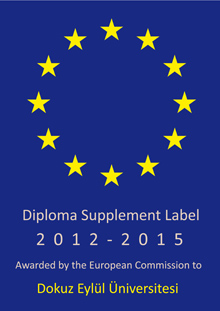DIPLOMA SUPPLEMENT
Dokuz Eylül University's application for Diploma Supplement Label in June 2012 has been found successful by European Commission after an evaluation process conducted by national team of Bologna experts in Turkey and by international experts on the European level. Dokuz Eylül University has been awarded with Diploma Supplement Label, which is a major step in Bologna Process.
Diploma Supplement is a supplementary document attached to the diploma, designed to exhibit the information about diploma and degrees of high education systems in Europe in a comprehensive format, thus reinforcing the international transparency. It facilitates international academic and occupational recognition of diplomas for institutions and corporations.
With my acknowledgements to the members of the Bologna Coordination Commission of Dokuz Eylül University and to all the academic and administrative staff for their great efforts during the Diploma Supplement Label application process.
President
At Dokuz Eylül University,
diploma supplement is being issued in a widely spoken European language (English), given automatically and free of charge to every student upon graduation.
In accordance with the Lisbon Convention on “the Recognition of Qualifications concerning Higher Education in the European Region" signed by Turkey in 2004 and the decision of the Council of Higher Education numbered 2005/2, Dokuz Eylul University provides free of charge and automatically, Diploma Supplement complementing Diploma, to all graduates involving the students who registered during 2005-2006 academic year and the following years.
Diploma Supplement given by Dokuz Eylül University is prepared in accordance with the model developed by the European Commission, Council of Europe and UNESCO-CEPES.
Please click on the link below to see the diploma supplement examples
LL.M. (second cycle) degree -2-
The Diploma Supplement (DS) is an important part of the Bologna Process which aims to create and strengthen a European Higher Education Area. With the increase of international mobility, fair evaluation of qualifications outside their home countries and enabling international recognition becomes a global need. Diploma supplement is a response to this need. Use of diploma supplement promotes transparency in higher education and enables fair and informed judgements about qualifications. Therefore, diploma supplement is a tool facilitating both international mobility and access to lifelong learning opportunities.
What is a diploma supplement?
Diploma supplement is a document accompanying the higher education diploma and providing a standardised description of the nature, level, context, content and status of the studies completed by its holder.
Diploma supplement aims to improve international transparency and recognition of qualifications (diploma, degree, certificate etc.). It is not a CV, a transcript, an automated system guaranteeing institutional equivalency or a substitute for the original higher education diploma.
Which information does a diploma supplement involve?
1. Information identifying the holder of the qualification
2. Information identifying the qualification
3. Information on the level of the qualification
4. Information on the contents and results gained
5. Information on the function of the qualification
6. Additional information
7. Certification of the supplement
8. Information on the national higher education system
What are the benefits offered by diploma supplement for students?
1. A diploma that is more readable and easily comparable abroad
2. A precise description of their academic career and the competencies acquired during the study period
3. An objective description of their achievements and competencies
4. Easier access to opportunities of work or further studies abroad
5. Fostering of students’ employability
Why is diploma supplement important for higher education institutions?
- It facilitates academic and professional recognition, thus increasing the transparency of qualifications.
- It protects national/institutional autonomy while offering a common frame which is accepted all over Europe .
- It promotes informed judgements about qualifications that can be understood in another educational context .
- It raises the visibility of the institution abroad.
- It promotes the employability of their graduates at national and international level.
- It helps to save time since it provides the answers to a lot of recurrent questions put to administrative services in institutions about the content and portability of diplomas.
The information above is retrieved from the website of European Commission. For more information on diploma supplement please visit:
European Commission, http://ec.europa.eu/education/lifelong-learning-policy/ds_en.htm
Higher Education Board, Recognition of Degrees and Diplomas, http://bologna.yok.gov.tr/?page=yazi&c=68&i=69
Bologna Process-European Higher Education Area, http://www.ehea.info/
